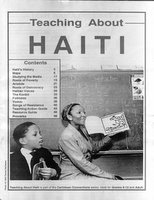
- This year's Haitian Studies Association Conference (HSA 2005) featured dozens of talks, many of which happened concurrently. I am reporting on the few which, after much tortured prioritizing, I managed to attend.
- Overall, there was a good balance of both talks on Haiti and the Haitian diaspora in America. A decent number of academics and various professionals attended from Haiti in contrast to this year's Caribbean Studies Association Conference where none to few Haiti-based academics presented despite the fact that it took place next door in the Dominican Republic.
The need to measure up
- Haitian-American not-for-profit representatives asked that haitianists generate more hard data on Haitians and their diasporas.
Haiti in Caribbean context, not
- Sadly, as is often the case and except for Prof. Jean-Marie Theodat's presentation on Haitiano-Dominican environmental issues, the conference lacked Caribbean context. There was no discussion that I know of on Haitian relations with Caricom --of which we are technically now a member--and the english-speaking Caribbean world, neither was there much discussion of the haitian diaspora in the Caribbean, this despite the fact that a substantial portion of the Haitian diaspora lives in Martinique, Guadeloupe, the Bahamas and the Dominican Republic. Hopefully HSA 2006 will correct this.
- Thankfully, geography professor Jean-Marie Theodat from the University of Paris talked about the thesis in his book Une Ile pour Deux, namely the often neglected geographical reality that Haiti shares an island with the Dominican Republic and that the two nations are intricately linked by what he calls "insular twinness." He predicted that unless policymakers in both countries begin acknowledging this reality, deadly environmental and demographic crises will ensue. On opening night Theodat also showed a film by his student Tristan Parry on Kenscoff produce farmers. See here for more on the film entitled Deye Mon Gen Mon.
Other highlights
- Lyonel Trouillot, award winning Haitian author of the critically acclaimed novel Les Fous de St-Antoine and noted intellectual, offered the keynote address. He lamented the non-existence of public spheres of cross-class intellectual exchange in Haiti.
- Odette Roy Fombrun a career educator and author of haitian history textbooks and conference honoree, introduced Lyonel Trouillot and talked about the need for Haiti to adapt to the globalized world. She insisted that Hispaniola should be called by its original name, Kiskeya.
- On a journalism panel, Michele Montas, an award winning journalist and widow of slain Haitian journalist Jean Dominique, presented on the state of Haitian journalism today. She cited a lack of autonomy and impartiality as one of the main problems.
- Haitian-American sexuality writer Amy Andre read an exchange, published in the anthology Waking up American, Growing Up Bilculturally, with a second-generation Haitian-American woman and her coming out as a lesbian to her family.
- Prof. Sharon Bell, a professor of French at Kent State University, explored bossale cultural themes in certain Haitian folk tales, drawing heavily for her interpretation of the tales on French anthropologist Gerard Bathelemy's book Le Pays en Dehors.
- Prof. Matthew Smith from the University of West Indies talked about David Nicholl's From Dessalines to Duvalier questioning whether its central thesis, that the main obstacle to the nation building effort in Haiti has been the color divide, still holds in today's Haiti.
- Filmmakers from the Hayti Project are preparing a documentary to air on PBS on the impact of echos of the Haitian Revolution on 19th century African American communities who called themselves "Hayti" (pronounced hey-TA-y).
- Amy Andre's website features her account of a panel on healthcare that I missed. The talk she highlights was on an HIV treatment program in rural Haiti which also reduces the stigma attached to HIV. (Go to her October 19, 2005 entry.)
- UMass Prof. Jean-Philippe Belleau talked about the Vepres de Jeremie and myths associated with the otherwise elusive concept of "elites" in Haiti.
- Pictures of the conference. blogs and internet
2 comments:
this is a very interesting blog.
I'll be sure to visit it again and again...
mbayisyen,
thanks for visiting. see you soon.
Post a Comment